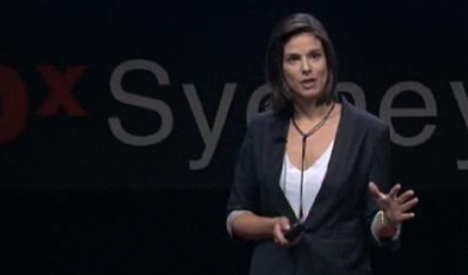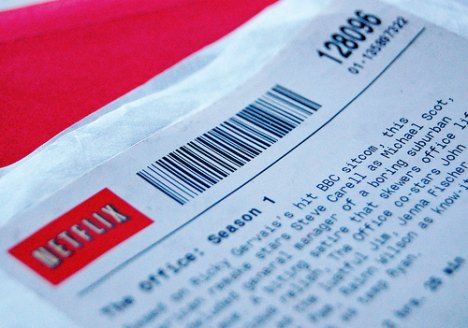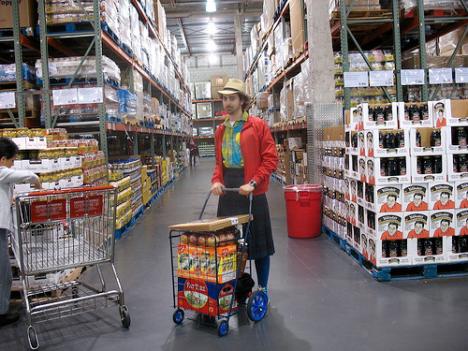Via TreeHugger
-----

Image via TED
The rise of lending libraries, swapping sites, and product as a service systems over the last 5 years or so has been impressive. We've seen an upswing in everything from clothing swap parties to local rental communities, to big services like Zipcar for getting around without having to own a car and even AirBnB for renting spare bedrooms from locals rather than hotel rooms. Rachel Botsman is the co-author of the book What's Mine Is Yours: The Rise of Collaborative Consumption. She studies how we're switching to a culture of sharing, and how that will transform business, consumerism, and the meaning and impact of social networking in our lives. She took the time to answer a few questions from us about what's behind collaborative consumerism, and what we can expect over the next few years.

Photo by Jamiesrabbits via Flickr Creative Commons
Lending libraries, rental sites for stuff, and even car sharing is getting more popular these days. But what area of consumables have you seen the most growth in for sharing or swapping among community members?
Swapping sites for goods with limited value or that fulfill a temporary need such a baby goods, books and DVDs are growing at a staggering rate; Peer-to-peer space rental sites (homes, gardens, parking spaces, storage etc.) such as AirBnb, Landshare and Parkatmyhouse are exploding in mainstream popularity; Bike sharing is the fastest growing form of transportation in the world; Co-working spaces are popping up in the world's major cities; I think 2011 is the year that we start to see skill or 'favor' share communities such as TaskRabbit, Skillshare and Hey Neighbor start to take off.
As collaborative consumerism becomes more practical and popular, how do you think it will shift our economy as a whole?
Big picture (and I am talking in 10-20 years time), I think we will see the way we measure 'wealth', 'growth' and 'happiness' being completely redefined. We are already seeing countries such as the UK, Canada and France looking at reinventing measures beyond GDP that give a picture of the holistic well-being of a nation. As Sarkozy commented, "So many things that are important to individuals are not included in GDP."
The way assets and income are taxed is going to be an interesting area as more people become "micro-entrepreneurs" earning money renting out their assets or bartering their skills. Peer-to-peer marketplaces essentially cut out a lot of middlemen but in the process create a whole array of cottage industries. Just think of Etsy. It's going to be interesting to see whether big brands and global businesses retain their appeal or whether small really is the next big thing.

Photo by Orin Zebest via Flickr Creative Commons
Some of the big environmental benefits we can see with a culture of sharing goods is reduced production of stuff, and definitely less waste. What are some of the lesser seen eco-benefits we might see?
In short, a) better utilization of assets b) products designed for longevity not obsolescence and c) mindset and behavior change.
All around us, we are surrounded by stuff that has what I call 'idling capacity', the untapped value of unused or underused assets. There are different kinds of idling capacity. Products that are underutilized (e.g. the average car that sits parked for 23 hours a day); products that fulfill a temporary need (e.g. baby goods and clothes): or those that diminish in appeal and value after usage (e.g. a movie or a book). At the heart of Collaborative Consumption is how we can use the latest technologies to redistribute 'idling capacity' and maximize usage.
I could not think of a more exciting time to be a designer. Longevity does not just mean designing with durable materials but making goods with modularity that can be seamlessly updated, as well as easily broken down for future reuse, resale or repair. It will mean designing products that can be easily shared, customized and personalized by different users. If a designer had a blank sheet of paper and was designing a car for shared usage versus individual ownership how would it differ? How can we use RFID tags to embed stories, images, and videos into shared goods so they become smarter and more interesting than individually owned products? There are endless sustainable design opportunities...
When people start using different examples of Collaborative Consumption they frequently describe a 'mindset change.' There are examples like car sharing where users think twice about whether they need to drive and thereby reduce their miles travelled by an approximated 45%. And there are examples like peer-to-peer rental, where people are using platforms such as Neighborgoods or Snapgoods. 'Owners' are realizing they can make money from renting out their assets peer-to-peer and 'renters' are experiencing the benefits of not needing to own. Finally, you have examples like 'swap trading' where people suddenly realize they are surrounded by assets they can swap to get what they want versus buying new stuff. The behaviour becomes addictive.
How far do you think we are from having collaborative consumerism be a mainstream way of using goods, and what are some of the steps we still need to take to get there?
We are just in the nascent stages of Collaborative Consumption. We have already seen examples like Netflix, eBay and Zipcar become household names but that has taken a decade - technology and consumer values were playing catch-up. But I think the current massive cultural and technological shift is accelerating the next wave of Collaborative Consumption at an astonishing rate.
I think it's critical for more big brands to enter the space. BMW, Daimler and Peugeot have all recently launched car sharing models. Amazon just announced its 'Buy Back' scheme of second-hand unwanted books. I would love to see a big bank enter the social lending space; for a retail giant like Target to launch an innovative rental model; for a brand like Zappos to create a shoe swapping and repair platform....
Big brands can reach scale faster, they prove there are real business models behind Collaborative Consumption (and there are), but they also create the social proof, the cultural cache for this new cultural and economy to become mainstream.
More on Collaborative Consumerism
Meet Rachel Botsman and Roo Rogers Authors of What's Mine Is Yours
TED Talk: Systems of Sharing About to Revolutionize Consumerism



